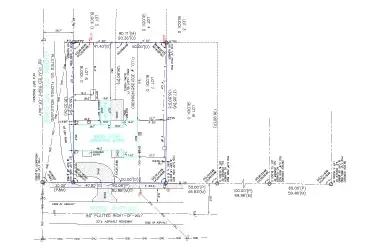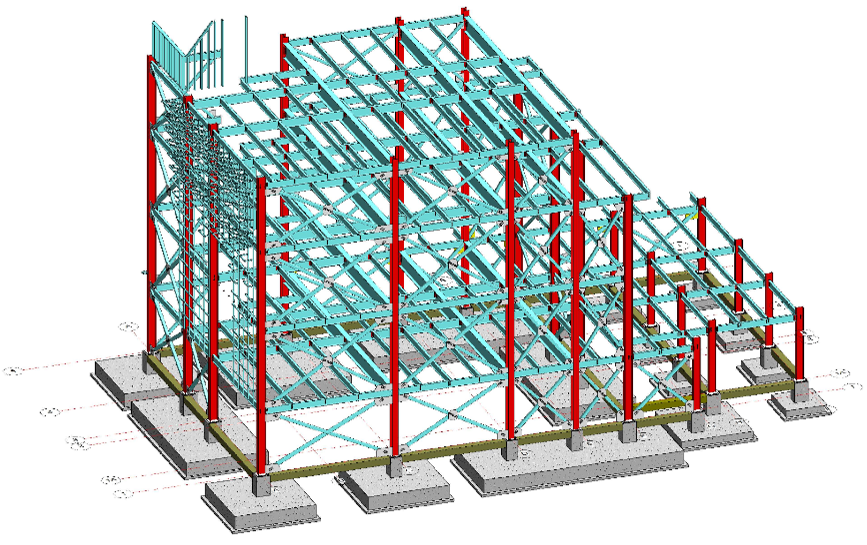Renowned Standing
Due to the skills we uphold, both large and small roll-out firms want to benefit from our knowledge and expertise.
Unleashing Creativity, One Pixel at a Time, with
Professional CAD Drafting Services
500+
CAD files delivered daily
14+
Years of Experience
360+
Active Clients
200+
Team of Experts
99.3%
Client Retention
For more than 14 years, Gsource has been a trailblazer in providing exceptional CAD drafting and designing services for clients in need of Architectural, MEP, Structural, Land Surveying, and Civil Engineering requirements. Our dedication to adopting the latest technology, from traditional surveying methods to innovative lidar and photogrammetry techniques, has consistently driven our clients' success. By staying ahead of the curve in these emerging fields, we have helped our clients get hold of a specialized niche in the marketplace.

For more than 14 years, Gsource has been a trailblazer in providing exceptional CAD drafting and designing services for clients in need of Architectural, MEP, Structural, Land Surveying, and Civil Engineering requirements. Our dedication to adopting the latest technology, from traditional surveying methods to innovative lidar and photogrammetry techniques, has consistently driven our clients' success. By staying ahead of the curve in these emerging fields, we have helped our clients get hold of a specialized niche in the marketplace.


Due to the skills we uphold, both large and small roll-out firms want to benefit from our knowledge and expertise.

We use high-tech solutions like an AI-based LiDAR Data processing system and an in-house Python-based processing engine for drone photogrammetry.

We have an R&D team that can handle the vast data collection, which can feel like a task for other companies.

We offer more than just detailed drawings. Our additional services include creating digital elevation models, ortho-mosaic maps, 3D models of the land, and contour maps.

The data used by us for creating topographic maps, volume calculations, and distance measurements provides results to the point.

The experience that our team holds is what sets us apart. With the training programs, our team of 300 members can deliver top-tier results laid over a 30,000-square-foot Class A Office space.

We are active members of national and international surveying, architectural, engineering, and geospatial organizations.

As a service provider, we’ve supported and served companies across the US. Our dedication produces excellent quality that propels industry success.
Your Project is Ready in 6 Easy Steps
The case study is about boundary surveying for a property, intending to locate the site of any renovations, including a shed. Finding the shed's location was essential to making sure it didn't cross the property line of the neighboring parcel. A thorough boundary survey was carried out in compliance with the client's requirements and local laws. This survey was conducted using on-site surveys and deed records. Its goal was to verify the shed's exact position and highlight all noteworthy upgrades on the owner's land.
Here, we conducted a detailed boundary survey of the land mentioned in the Deed/Title commitment. The details of the land were explained using the Metes and Bounds method in the Deed. To conduct the survey, the documents used were deed legals of adjacent land to verify its boundaries, a detailed and accurate field survey sketch, a .txt or .csv file of point coordinates retrieved from the land survey, and real-time images of the owner’s property for a better understanding of the actual condition. The team utilized CAD drafting software to ensure accurate and efficient results throughout the drafting process.
The property's primary problem was the difference between the deed's legal border and the boundary as established by the survey. Very few reference sites were discovered to be able to precisely determine the boundaries of the area during the first survey phase. A major obstacle was created by this 3-foot difference in the border.
We found errors in the property's legal description after examining the legal descriptions of the relevant property and the nearby parcels. There was a mistake in the legal description as evidenced by the wrong bearings and distances given. We determined the precise boundaries of the property by correcting this inaccuracy in compliance with the adjacent deed.
Later, as the lot and surrounding deeds were being drafted, we saw that there weren't enough restrictions in the area, which made it difficult for us to perform a boundary resolution. To support our claim of rotation, we were encouraged to ask the client for further controls. We rectified the border issues after obtaining the needed data and carrying out additional studies.
To produce an accurate Boundary survey, we investigated several rotation choices using the identified monumentation, took into account the location of modifications, and referred to recent photos. This survey included dimension ties on every side of the land and included information on all improvements, including fences and buildings. Furthermore, from the Title Commitment SBii Exceptions, easements affecting the subject land were located.
To guarantee the integrity and correctness of the survey, a thorough quality check was carried out after the drafting process. To ensure the survey was accurate and free of errors, every detail was carefully examined against a checklist.
The survey revealed that the shed continued one foot onto the adjacent parcel beyond the property border; this was indicated in red on the drawing to indicate the distance to the property line. Upon submission, the client was quickly informed of this disparity.
As a result, the final survey verified that the shed did, in fact, slightly intrude into the neighboring property, which was consistent with the results of the field survey and the documented legal description. For the client's reference, the survey displayed inaccuracy in the legal description.


The case study is about boundary surveying for a property, intending to locate the site of any renovations, including a shed. Finding the shed's location was essential to making sure it didn't cross the property line of the neighboring parcel. A thorough boundary survey was carried out in compliance with the client's requirements and local laws. This survey was conducted using on-site surveys and deed records. Its goal was to verify the shed's exact position and highlight all noteworthy upgrades on the owner's land.
Here, we conducted a detailed boundary survey of the land mentioned in the Deed/Title commitment. The details of the land were explained using the Metes and Bounds method in the Deed. To conduct the survey, the documents used were deed legals of adjacent land to verify its boundaries, a detailed and accurate field survey sketch, a .txt or .csv file of point coordinates retrieved from the land survey, and real-time images of the owner’s property for a better understanding of the actual condition. The team utilized CAD drafting software to ensure accurate and efficient results throughout the drafting process.
The property's primary problem was the difference between the deed's legal border and the boundary as established by the survey. Very few reference sites were discovered to be able to precisely determine the boundaries of the area during the first survey phase. A major obstacle was created by this 3-foot difference in the border.
We found errors in the property's legal description after examining the legal descriptions of the relevant property and the nearby parcels. There was a mistake in the legal description as evidenced by the wrong bearings and distances given. We determined the precise boundaries of the property by correcting this inaccuracy in compliance with the adjacent deed.
Later, as the lot and surrounding deeds were being drafted, we saw that there weren't enough restrictions in the area, which made it difficult for us to perform a boundary resolution. To support our claim of rotation, we were encouraged to ask the client for further controls. We rectified the border issues after obtaining the needed data and carrying out additional studies.
To produce an accurate Boundary survey, we investigated several rotation choices using the identified monumentation, took into account the location of modifications, and referred to recent photos. This survey included dimension ties on every side of the land and included information on all improvements, including fences and buildings. Furthermore, from the Title Commitment SBii Exceptions, easements affecting the subject land were located.
To guarantee the integrity and correctness of the survey, a thorough quality check was carried out after the drafting process. To ensure the survey was accurate and free of errors, every detail was carefully examined against a checklist.
The survey revealed that the shed continued one foot onto the adjacent parcel beyond the property border; this was indicated in red on the drawing to indicate the distance to the property line. Upon submission, the client was quickly informed of this disparity.
As a result, the final survey verified that the shed did, in fact, slightly intrude into the neighboring property, which was consistent with the results of the field survey and the documented legal description. For the client's reference, the survey displayed inaccuracy in the legal description.
The case study focuses on creating comprehensive permission paperwork that complies with all laws and requirements for commercial buildings. Floor plans, site plans, and other parts are all included in the file, along with the updated and revised designs. It also included ceiling plans, structural plans, HVAC plans, egress plans, electrical plans, plumbing plans, and more. All of these designs were accurately and completely depicted in the drawings in the file, in compliance with the construction requirements. Every component of the project was thoughtfully incorporated while making sure they complied with all construction codes and regulations.
The scope of work included drawing up a comprehensive site plan that indicated property boundaries, setbacks, and the locations and sizes of all planned structures. A description of the locations of doors and windows, measures, and other pertinent information was also included in the floor plans, along with significant remarks regarding the floors. To provide a comprehensive understanding of the building's materials, construction process, and various levels, sections and comprehensive information were also presented.
The main challenge was the unclear drawings with poor quality of input. The work that was to be done could not be recognized due to these drawings. Also, the measurements weren’t enough and the hand-written notes were hard to understand.
We developed a thorough grasp of the project requirements after thoroughly reviewing the inputs that were provided. This allowed us to modify our efforts properly. A CAD design approach was used to meticulously draw the plans. To find and fix any little flaws, extensive quality control was used.
To make sure there were no discrepancies, these designs and the components they included were carefully inspected. The quality and precision of the drawings were also verified by this method.
Following our careful review of all necessary conditions, we carefully created a complete set of permission documentation. These records are essential to getting the project approved. They provided all the facts, specifications, and specifics required by regulatory bodies to examine and evaluate the suggested plans. Our rigorous approach ensured that all project details were sufficiently recorded, resulting in a clear and comprehensive permit application procedure. With the help of this painstakingly drafted permission paperwork, we were prepared to proceed with the approval procedure and start the project.


The case study focuses on creating comprehensive permission paperwork that complies with all laws and requirements for commercial buildings. Floor plans, site plans, and other parts are all included in the file, along with the updated and revised designs. It also included ceiling plans, structural plans, HVAC plans, egress plans, electrical plans, plumbing plans, and more. All of these designs were accurately and completely depicted in the drawings in the file, in compliance with the construction requirements. Every component of the project was thoughtfully incorporated while making sure they complied with all construction codes and regulations.
The scope of work included drawing up a comprehensive site plan that indicated property boundaries, setbacks, and the locations and sizes of all planned structures. A description of the locations of doors and windows, measures, and other pertinent information was also included in the floor plans, along with significant remarks regarding the floors. To provide a comprehensive understanding of the building's materials, construction process, and various levels, sections and comprehensive information were also presented.
The main challenge was the unclear drawings with poor quality of input. The work that was to be done could not be recognized due to these drawings. Also, the measurements weren’t enough and the hand-written notes were hard to understand.
We developed a thorough grasp of the project requirements after thoroughly reviewing the inputs that were provided. This allowed us to modify our efforts properly. A CAD design approach was used to meticulously draw the plans. To find and fix any little flaws, extensive quality control was used.
To make sure there were no discrepancies, these designs and the components they included were carefully inspected. The quality and precision of the drawings were also verified by this method.
Following our careful review of all necessary conditions, we carefully created a complete set of permission documentation. These records are essential to getting the project approved. They provided all the facts, specifications, and specifics required by regulatory bodies to examine and evaluate the suggested plans. Our rigorous approach ensured that all project details were sufficiently recorded, resulting in a clear and comprehensive permit application procedure. With the help of this painstakingly drafted permission paperwork, we were prepared to proceed with the approval procedure and start the project.
At Gsource, our team of skilled engineers specialize in designing and drafting manufacturing and packaging solutions.








At Gsource, our team of skilled engineers specialise in designing and drafting manufacturing and packaging solutions.
Yes, we provide civil engineering projects with 3D modeling and visualization services. Our team creates accurate and comprehensive representations of project plans using the most recent 3D modeling technologies. This makes it possible for clients to see the project more clearly and spot any possible problems before construction even starts.
For CAD drawing, we use industry-leading programs like Tekla, AutoCAD, and Revit, among others. The sophisticated capabilities of these software tools enable the creation of accurate and detailed drawings, guaranteeing efficiency and accuracy in our drafting process. Furthermore, we maintain current versions of these software packages to take advantage of their improved features and functions, which enables us to provide premium CAD drawing services catered to your particular requirements.
We provide CAD drafting services for a variety of land surveys, such as border, topographic, construction, and subdivision surveys. For whatever kind of project - residential, commercial, or industrial. Our team can manage CAD drawings for a range of land survey types to satisfy your unique requirements.
We use a strict quality control procedure to guarantee that our designs are precise and accurate. This involves using sophisticated CAD software with integrated error-checking features and conducting in-depth reviews by seasoned CAD designers and engineers. To keep our designs as accurate as possible, our team also complies with industry standards and best practices.
Yes, our services are designed to satisfy the demands of many industries, such as commercial, residential, right-of-way (ROW), and Lidar-based surveys. We are aware that every industry has different needs and demands, and we are skilled at tailoring our services to meet those needs. We may provide precise mapping and data collecting using Lidar technology, or we can undertake surveys for residential properties, commercial developments, or right-of-way projects. Our skills are customized to meet your project's unique requirements.
Our turnaround time varies according to the project's complexity and size. Nonetheless, we work hard to create designs with the highest level of accuracy and quality within the given time frames.
Yes, we make sure that all of the design and drafting work we do in civil engineering is supervised and approved by certified professional engineers. This guarantees that all designs adhere to the relevant regulatory criteria and standards. Our team of skilled and knowledgeable engineers is committed to providing top-notch, legally acceptable designs for your projects. Our stamped and signed designs are dependable and adhere to industry standards, so you may have faith in them.
Please use the contact form on our website, connect with us via email at info@gsourcedata.com, or Call Us at +1(888) 322-9925 to Gsource Technologies to obtain a customized price for our CAD drafting services. Our skilled staff is prepared to go over the specifics of your project with you and provide you with a customized solution that satisfies your demands. Get started on your project by contacting us and letting us turn your thoughts into reality!
When clients have revisions or changes, we receive the instructions via email or the Stars application. Once the changes are understood, they are worked on. Then these changes and revisions are saved and uploaded to the application. These are then re-sent to the client via email.
(Enter captcha image text in box)
At Gsource Technologies, we’re ready to help! Tell us what you need, and we’ll connect you with the right experts.